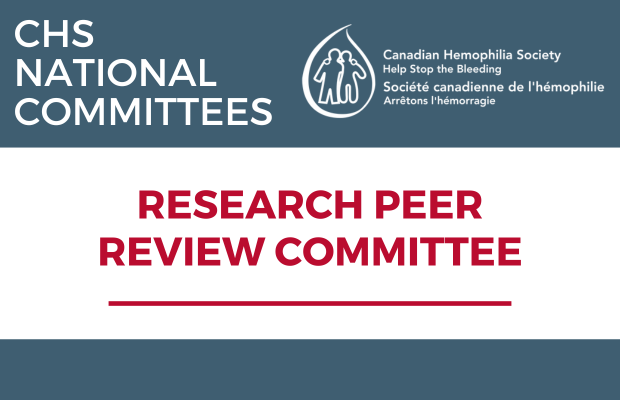Contributing to the advancement of scientific knowledge

PREAMBLE
We have already come to the end of this important series of articles about the national board and operational committees on which our volunteers sit. On this occasion, we are pleased to present the Research Peer Review Committee.
RESEARCH PEER REVIEW COMMITTEE
The Research Peer Review Committee reviews submissions made in response to calls for competitive research proposals offered by the Canadian Hemophilia Society (CHS), and to advise the CHS with respect to continuous quality improvement in the review process. The principles inherent in the review process are identification of excellence, provision of equity of opportunity, and due diligence in the allocation of CHS research funds.
The responsibilities of the committee are to:
- Undertake timely, transparent, fair, objective and thorough review of eligible applications;
- Submit written summaries of evaluations, including scores and critique of each application to the chairperson of the committee;
- Complete a conflict of interest statement for each grant application;
- Participate in meetings/teleconferences to reach consensus on the award selection;
- Submit feedback on the review process;
- Advise the CHS, as needed, on research priorities within the field of bleeding disorders that will allow the CHS research programs to have maximal impact;
- Advise the CHS, as needed, on the types of research programs (e.g. fellowships, basic research, clinical research, research by young investigators…) that are best suited to the persons and processes served by the organization.
The members of the committee are appointed by the chair of the Research Peer Review Committee and consist of individuals with relevant research interests, skills or experience. In choosing members, consideration will also be given to varied representation from different disciplines (medical, nursing, physiotherapy, psychosocial). One member representing the patient perspective is also named.
The term of appointment for members is two years and members are eligible for reappointments. To ensure continuity, efforts must be made to ensure that the majority of the Research Peer Review Committee members do not rotate at one time.
Current members of the Research Peer Review Committee are:

Living with a bleeding disorder, I have had the privilege in participating in research both as a patient and as an investigator and have seen the merits of scientific advancement from both ends. So, when I was asked to sit on the Research Peer Review Committee, it was a no brainier. I saw it as an opportunity to combine my research background and training as a medical student with my personal journey living with a bleeding disorder to give back to the community.
My background in research and medical education allows me to approach reviews with a critical eye and a deep understanding of scientific methodologies. Additionally, my personal experience with a bleeding disorder gives me insight into the clinical implications of the research being reviewed. By combining these perspectives, I can ensure a variety of opinions and expertise areas are considered during the review process, leading to a more comprehensive evaluation of each project’s potential. My participation contributes to a patient-centred approach within the committee’s decision-making process, ultimately guiding the allocation of resources towards research endeavours with the greatest potential for meaningful outcomes in patient care.
To someone interested in joining the Research Peer Review Committee, I emphasize that it’s a fantastic opportunity to get involved with the research community. Not only do you have the chance to contribute to the advancement of scientific knowledge, but you also gain valuable experience in critical analysis and evaluation. Moreover, being part of a committee comprised of esteemed hematology experts provides invaluable learning experiences and opportunities for professional growth. As well, it’s a great way to meet other people interested in the same end goal – improving the lives of patients with bleeding disorders. It’s a privilege to contribute to advancing knowledge and improving care for individuals with bleeding disorders through this role. – CAITLYN LEE
I joined the CHS Peer Review Committee in 2019 because my Ph.D. research focused on hemophilia and the patient experiences of physiotherapy care. It has been a pleasure working on the Peer Review Committee for the past five years, I have had the opportunity to meet committee members who are dedicated to improving the lives of individuals with bleeding disorders through research.
With my background as a physiotherapist in a bleeding disorder treatment centre and my focus on patient-oriented and health services research, I think I bring a unique perspective to the committee. I can highlight the importance of research about improving joints and muscles, as well as a person’s pain and function. I can also provide a health services researcher’s perspective, which is about improving how health care is delivered for people with bleeding disorders.
Being on the Peer Review Committee is a great way to help ensure that the CHS funds research that improves the lives of people with bleeding disorders. It has also been a great learning opportunity for me as I move into a career in research. – ERIN McCABE, PT
Being part of the Research Peer Review Committee allows me to collaborate and create ties with other bleeding disorder health care professionals elsewhere in Canada. It’s very interesting to see the research being done in the field and to be able to observe the progression of studies from year to year. The committee also has a positive impact by making suggestions and comments that will improve future projects. – DR. CATHERINE VÉZINA, FRCPC
I had the opportunity of taking part in a CHS research program in the past. When I was invited to sit on the Research Peer Review Committee, I felt it would be a great opportunity to look at the research process from a different perspective, and also to apply a nursing lens when reviewing applications.
I was asked “what would I say to someone who would be interested in joining the Research Peer Review Committee?” I would tell them that it is a great way to connect with others involved in the field of hemostasis in Canada – everyone is so supportive and it’s always interesting to see the perspective they bring to the table. I have learned so much from other members who have much more experience than I do! – CELINA WOO, NP




